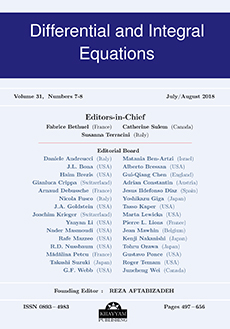Abstract
We consider the system $$ \begin{cases} -\varepsilon^{2} \Delta u +W(x)u=Q_{u}(u,v)+ \frac{1}{2^*}K_u(u,v)~\text{in } \mathbb{R}^N, \\ -\varepsilon^{2} \Delta v +V(x)v=Q_{v}(u,v)+ \frac{1}{2^*}K_v(u,v)~\text{in } \mathbb{R}^N, \\ u,v \in H^{1}(\mathbb{R}^N),u(x),v(x)>0~~\text{for each } x \in \mathbb{R}^N, \end{cases} $$ where $2^*=2N/(N-2)$, $N \geq 3$, $\varepsilon>0$ is a parameter, $W$ and $V$ are positive potentials, and $Q$ and $K$ are homogeneous function with $K$ having critical growth. We relate the number of solutions to the topology of the set where $W$ and $V$ attain their minimum values. In the proof, we apply Ljusternik-Schnirelmann theory.
Citation
Claudianor O. Alves. Giovany M. Figueiredo. Marcelo F. Furtado. "Multiple solutions for critical elliptic systems via penalization method." Differential Integral Equations 23 (7/8) 703 - 723, July/August 2010. https://doi.org/10.57262/die/1356019192
Information





